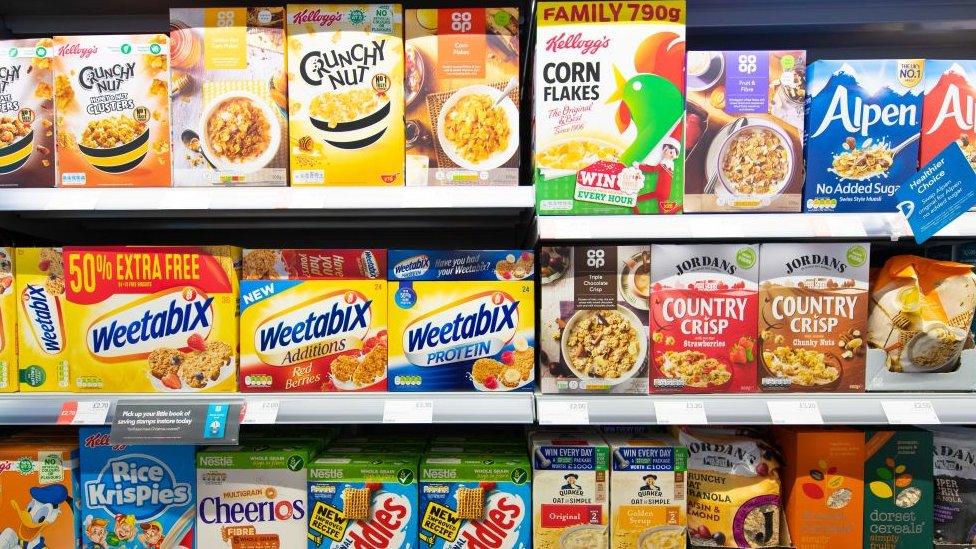Kellogg's loses court case over sugary cereal supermarket offers
- Published
- comments

Kellogg's will not be allowed to promote sugary cereals in supermarket special offers, a court has ruled.
In-store promotions on food and drink high in fat, salt or sugar will be restricted under new rules for England., external
Food giant Kellogg's had taken the government to court arguing the rules did not take into account the nutritional value of added milk.
But the Royal Courts of Justice ruled in favour of the government. Kellogg's said it was "disappointed".
"It makes little sense to us that consumers will be able to buy other products, like donuts and chocolate spreads, on promotion - but not many types of breakfast cereals," said Kellogg UK managing director, Chris Silcock.
The Department of Health and Social Care said it strongly welcomed the judgement as location promotion restrictions were expected to deliver more than £57bn of health benefits.
"Together with the volume price restrictions, these changes will protect children up and down the country from products high in saturated fat, sugar or salt," a spokesperson said.
From October, foods deemed high in fat, sugar or salt will be banned from prime spots such as checkouts, store entrances, aisle ends and their online equivalents.
The halt on promotions such as buy-one-get-one-free offers has been delayed by the government for 12 months due to the cost of living crisis.
Popular Kellogg's brands such as Crunchy Nut Corn Flakes and Fruit and Fibre are classified as high sugar in their dry form.
But Kellogg's argued including added milk would change the calculation by reducing the proportion of sugar and salt content relative to the weight of the overall serving.
The company said independent market data showed cereals were eaten with milk or yoghurt in 92% of cases.
But Judge Mr Justice Linden said Kellogg's cereals "do not come with instructions for preparation which say that they should be consumed with milk".
Mr Justice Linden said there was "no dispute" that breakfast cereals can be part of a healthy diet.
He added, however, that promoting the nutritional benefits of a particular breakfast cereal "does not affect the point that if it contains excess fat, sugar or salt, that feature of the product is adverse to a child's health".
"Nor does mixing a breakfast cereal which is high in, for example, sugar, with milk alter the fact that it is high in sugar."
His judgement said he found no unfairness to Kellogg's and the public health case for the new rules was compelling, proportionate and rational.
Kellogg's Mr Silcock said the firm would not appeal against the judgement, but urged the government to rethink the new rules.
"By restricting the placement of items in supermarkets, people face less choice and potentially higher prices," he added.
Related topics
- Published27 April 2022

- Published25 July 2020
- Published24 June 2021

- Published7 October 2020
